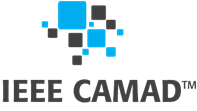CALL FOR PAPERS
Circular Economy (CE) has attracted attention in recent years. It is characterized as an economy that is restorative and regenerative by design, and which aims to keep products, components and materials at their highest utility and value at all times. It is conceived as a continuous positive development cycle, reforming the current economy model of take-make-dispose, by preserving and enhancing natural capital, optimizing resource yields and minimizing system risks by managing efficiently finite stocks and renewable flows. Circular economy, if done correctly, is positioned to reduce consumption of new materials by 32% within fifteen years, and by 53% by 2050, while, even without wide scale adoption, just moving toward a circular economy could eliminate 100 million tons of waste globally in the next five years alone.
At the same time, many companies have already begun to integrate Big Data, in particular those originating from Internet of Things(IoT) technologies into their operations, and they make projections for future penetration while spanning a big range, all point towards significant growth. It is estimated that 10 billion physical objects with embedded information technology already exist today, while it is expected that the number of connected devices and objects will reach 50 billion by 2020, enabling IoT to have an estimated total economic impact of $3.9–11.1 trillion per year by 2025. As the Big Data movement demonstrates, businesses today are hungrier than ever for data as the data analysis capacity of IT continues to improve, and they are able to improve many aspects of their business models through the use of data.
The interplay between Big Data, generated by heterogeneous and distributed IoT intelligent assets, and the Circular Economy provides a fertile ground for innovation and value creation. IoT, with its smart sensors, actuators and connected technologies, can play a key role in providing increasingly valuable data about things(assets and resources) like energy use, asset-utilization (or under-utilization), and material flows. This, in turn, enables the use of bring data-driven decision-making in various vertical domains (e.g. smart cities, manufacturing/industry, healthcare), optimizing the effectiveness and efficiency of systems and processes, often in an automated manner, through machine learning technologies. Thus, the rapid increase in the number of internet-connected objects which gives assets new smart capabilities is reshaping the economy and provides new services, saving time for people and businesses, improving our quality of life, and creating significant value along the way. Nevertheless, businesses and end-users alike are continuously facing unprecedented challenges and increasing levels of complexity, when trying to benefit from the above developments. The further intertwining of data, technology, business models, artificial intelligence and societal trends has created non -linear complexity that seems unmanageable to multiple stakeholders.
In this context, this Special Session seeks original and unpublished work on research topics including, but not limited to, the following:
- Architectures for collecting and managing vast amounts of data generated by heterogeneous, distributed intelligent assets
- Technological building blocks that will to contribute to the co-design of secure and sustainable distributed intelligent assets
- Novel model-driven methods and execution platforms for extreme-scale analytics, deep analysis, precise predictions and decision-making support with particular focus in Causal Discovery and the required characteristics for Circular Economy-aware manufacturing (e.g. predictive maintenance)
- IoT enablers for the Circular Economy
- Circularity as a key enabler for IoT technologies and applications
- IoT-enabled Circular Economy business models and IoT-enabled provisioning of circular economy service supply chains
- Adaptive Internet of Things and Participatory Sensing (IoTPS)-based Smart City applications assisted with Big Data analytics and Cloud services
- Technologies enabling the capture, processing, analysis and exchange of contextualized information amongst citizens and/or amongst citizens and public authorities utilizing Big Data analytics and Cloud technologies
- Novel mechanisms for processing large amounts of IoTPS data utilizing ML algorithms to detect complex events and to create actionable contextual information
- Protocols to support the inter-connectivity of large numbers of heterogeneous software and hardware smart objects, as well as other platforms/systems of similar nature
- Data anonymization, encryption and authenticity preserving mechanisms to ensure that user/object sensitive information will not be available to any third parties without the user consent
- Mechanisms to ensure the trustworthiness, confidentiality, and general security of IoT platforms and their components
ORGANIZERS
- Sofia Alexaki, Ecole des Ponts Business School, FR
- Ioannis Askoxylakis, Foundation for Research and Technology-Hellas, GR
- Giorgos Demetriou, Ecole des Ponts ParisTech, FR
- Konstantinos Fysarakis, Sphynx Technology Solutions AG, CH
- Vasilis Katos, Bournemouth University, UK
SUBMISSION
Manuscripts must be prepared in the standard IEEE two-column conference format with a maximum paper length of six (6) printed pages (maximum 1 additional page with over length page charge) and submitted via the provided EDAS link.
CO-SPONSORED PROJECTS
Co-sponsored by MSCA-RISE projects CE-IoT and IDEAL-CITIES.




